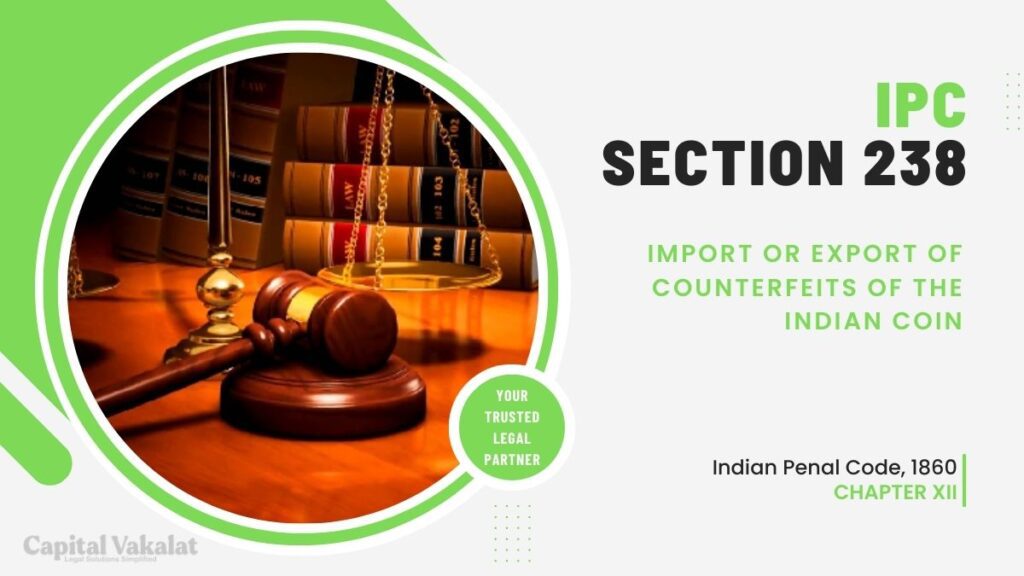Section 238 of the Indian Penal Code (IPC) addresses a crucial aspect of preserving the integrity of the Indian economy and upholding trust in its monetary system. This legal provision pertains to the import or export of counterfeits of the Indian coin.

In this article, we will delve into the details of Section 238 IPC, its significance, the implications of counterfeiting, and the measures in place to combat this offense.
Understanding Section 238 IPC
Section 238 of the Indian Penal Code, 1860, primarily focuses on counterfeiting Indian coins. It outlines that anyone who knowingly imports or exports counterfeit Indian coinage can face stringent legal consequences. This legal provision serves as a crucial deterrent against any attempts to undermine the Indian monetary system.
Violating Section 238 IPC can lead to severe penalties, including imprisonment and fines. These penalties are in place to dissuade individuals from engaging in activities related to counterfeit coins. The historical context of this law dates back to the colonial era when the British Raj introduced this provision to safeguard the economic interests of India.
The Importance of Coinage
Coins have always held a significant role in any economy. In India, they are not only a means of exchange but also bear historical and cultural significance. Over the years, Indian coinage has evolved, reflecting the rich diversity of the nation. The introduction of various denominations and designs has been instrumental in facilitating trade and commerce.
Counterfeiting: A Serious Offense
Counterfeiting Indian coins is a serious offense due to the potential harm it can inflict on the economy and public trust. Counterfeit coins can enter circulation, leading to losses for businesses and individuals. When people lose faith in the authenticity of their currency, it can undermine the entire monetary system.
Prosecution and Penalties
Section 238 IPC outlines the penalties for those found guilty of importing or exporting counterfeit Indian coins. Depending on the severity of the offense, violators can face imprisonment for a term ranging from one year to life. Additionally, they may be subject to fines.
Several cases have been reported where individuals and groups attempted to import or export counterfeit coins, and Section 238 IPC was invoked for prosecution. These cases serve as a testament to the Indian legal system’s commitment to protecting the nation’s monetary integrity.
Challenges in Detecting Counterfeits
Detecting counterfeit coins is a challenging task. Criminals are often adept at creating counterfeit coins that closely resemble genuine ones. However, various methods are employed to identify counterfeit coins, including detailed visual inspection, magnetic susceptibility, and X-ray analysis. Technology and forensics play a vital role in this process.
Preventive Measures
Preventing the circulation of counterfeit Indian coins is a collaborative effort that involves government agencies and mints. The Reserve Bank of India (RBI) and other relevant authorities work diligently to ensure the security of Indian currency. Sophisticated security features are integrated into coins to deter counterfeiters.
Public Awareness and Education
One of the essential aspects of countering counterfeit coins is educating the public. People should be aware of the features that distinguish genuine coins from counterfeits. Regular awareness campaigns and dissemination of information can empower individuals to identify counterfeit coins and report them to the authorities.
International Perspective
Counterfeiting is not limited to India; it is a global issue. Many countries have stringent laws in place to combat coin counterfeiting, and international cooperation is essential to prevent the circulation of counterfeit coins across borders. The impact of counterfeit coin circulation extends beyond individual nations, affecting the global economy.
Conclusion
In conclusion, Section 238 IPC plays a pivotal role in maintaining the sanctity of Indian coinage. Counterfeiting coins is not merely a financial offense; it jeopardizes the trust and integrity of the entire monetary system. As technology evolves, so do the methods employed by counterfeiters, making it imperative that India’s legal framework and law enforcement agencies remain vigilant.
Upholding the sanctity of Indian coinage requires a collaborative effort, involving both the government and the public. Public awareness, education, and the integration of advanced security features into coins are vital components of this effort. In a world where economic integrity is paramount, the enforcement of Section 238 IPC is a testament to India’s commitment to preserving the trust of its citizens in their monetary system.
Frequently Asked Questions
What are the penalties for violating Section 238 IPC?
Penalties for violating this section include imprisonment, which can range from one year to life, and fines.
How can one identify counterfeit Indian coins?
Identifying counterfeit coins involves a combination of visual inspection and, in some cases, advanced techniques like X-ray analysis.
What is the historical context of Section 238 IPC?
Section 238 IPC has its roots in the colonial era when it was introduced to protect India’s economic interests.
How do other countries address coin counterfeiting?
Other countries have their own legal provisions and measures to combat coin counterfeiting, and international cooperation is crucial to prevent cross-border counterfeit coin circulation.